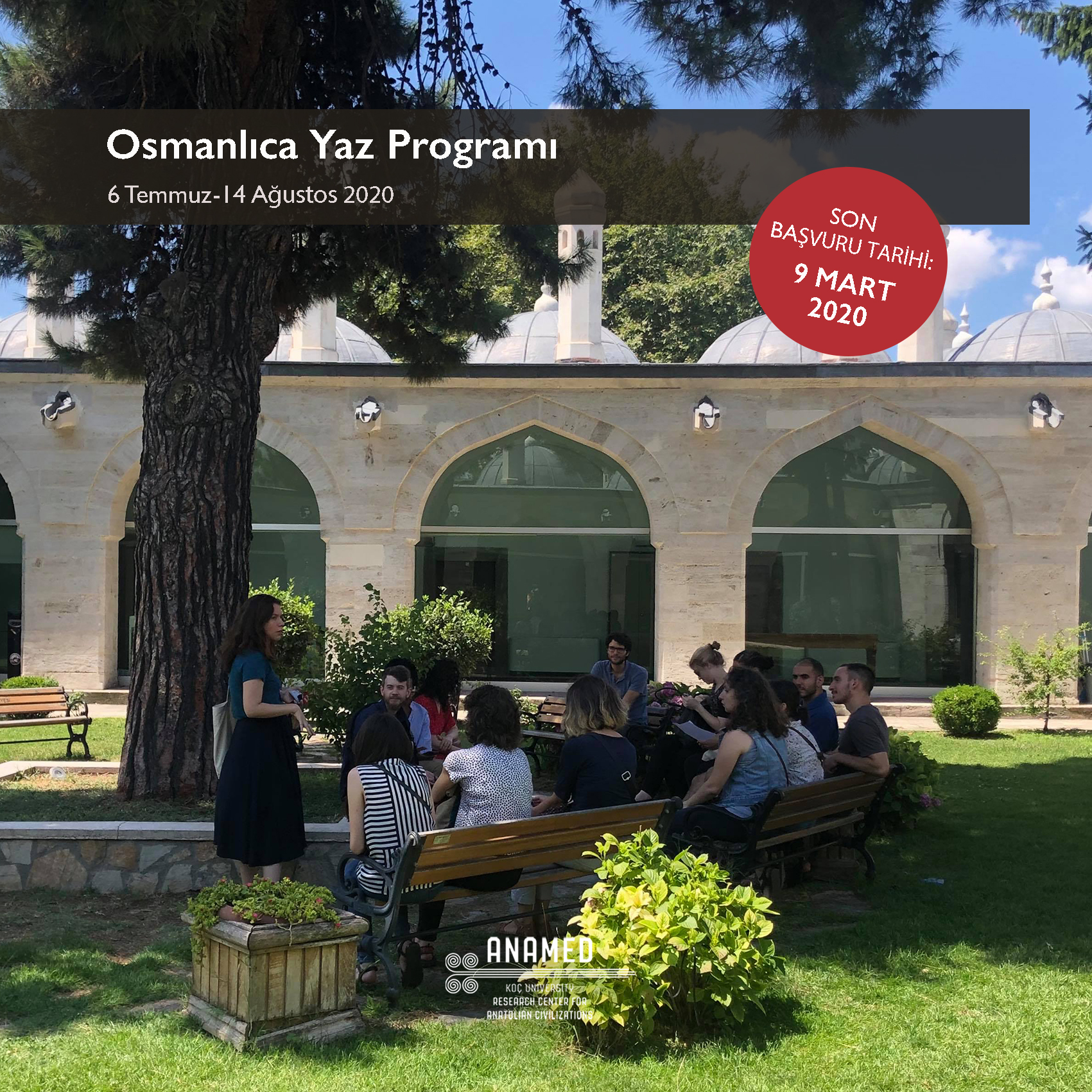
Date: 27 June – 4 August 2022
Application Period: 15 February – 15 March 2022 28 March 2022, 23:59 (GMT +03:00, Türkiye Time)
Organized by Koç University Research Center for Anatolian Civilizations (ANAMED), this 6-weeks intensive in person summer program aims to develop students’ reading and comprehension skills and expertise on a variety of Ottoman sources including archival documents, various manuscripts, and epigraphic material. The material will present a wide array of content and narrative types. The program is designed to accommodate the needs of participants entering with different levels of Ottoman literacy. Ottoman classes are complemented by Persian, Arabic and modern Turkish classes.
The languages of the program are Turkish and English. For more information about the program and how to apply please see down below.
- Applicants must be enrolled in a MA or a PhD program.
- Applicants must have had at least half an academic year of Ottoman instruction. Complete beginners are not eligible to apply. It is essential that you give details about your prior Ottoman instruction on the application form.
- The participants should be aware that instruction will be partly or completely in Turkish with some explanations in English. Therefore, a solid knowledge of modern Turkish grammar is a necessity. We understand that some students are not conversant in Turkish, but can read and follow when spoken to; which is acceptable.
- Knowledge of Persian and/or Arabic is preferable, but not necessary.
Ottoman classes are conducted Monday through Thursday at two levels. (see: Program Schedule)
Intermediate-Level Classes (Mo–Th; 09:00-10:30; 10:45-12:00 GMT +03:00, Türkiye Time) assumes that participants are already familiar with the basics of Ottoman language (orthography, basic vocabulary) and are able to read printed texts of intermediate-level complexity by using dictionary with some ease. The class will introduce them to various text and script types. (see: Tentative Syllabus)
Advanced-Level Classes (Mo–Th; 09:00-10:30; 10:45-12:00 GMT +03:00, Türkiye Time) require that participants feel comfortable taking on the task of deciphering complex Ottoman texts from different periods by using dictionary. The class will cover various text and script types. (see: Tentative Syllabus)
Persian, Arabic and modern Turkish Classes are designed to supplement the students’ Ottoman reading skills. Mastery of Ottoman reading, and comprehension requires a good familiarity with Turkish, Persian, and Arabic grammar and vocabulary. Students may choose to attend any combination of classes. See Turkish (live classes on Zoom), Arabic, and Persian course descriptions.
Daily participation is mandatory for all students. Students regularly missing classes will be dropped from the program.
All course materials will be provided by the instructors.
Dr. Yaşar Tolga CORA (Boğaziçi University) – Ottoman Instructor
Dr. Cora is a historian of social and economic history of the late Ottoman Empire, with a particular focus on Armenian communities in Anatolia. He graduated from the University of Chicago in 2016 and then served as a post-doctoral fellow at the University of Michigan, Ann Arbor in 2016-17. Dr. Cora is currently assistant professor in the Department of History at Boğaziçi University, teaching courses on the late Ottoman Empire, the Turkish Republic and the Modern Middle Eastern history.
Gheis EBADI (Berlin Humboldt University) – Persian Instructor
Gheis Ebadi is research assistant at the Institute for The Asian and African Studies at Berlin Humboldt University. He is working on Qizilbash tribes and their effects on Ottoman and Iranian administrations, formation and structure of sects like Alevi and Bektashi. Mr. Ebadi taught at the Department of Turkish Language and Literature at Allameh Tabatabei University of Tehran (2011-2012) and also Classical and Modern Persian courses at Bilkent University (2013-2015).
Zeynep Fahriye GÜR – Turkish Instructor
Zeynep Gür ‘s a lecturer of Turkish at Georgetown University. She has earned her degree in Turkish Language and Literature from Istanbul University. She has been teaching Turkish at all levels and at various institutions for almost 20 years.
Dr. İpek HÜNER-CORA (Boğaziçi University) – Ottoman Instructor
İpek Hüner Cora completed her Ph.D. at the Department of Near Eastern Languages and Civilizations at the University of Chicago in 2018. Her research interests include the history of Ottoman literature, gender and sexuality as well as history of reading. She has taught Advanced Turkish and Ottoman Turkish courses at the University of Chicago. She is currently teaching courses on Ottoman language and gender and space in the early modern Ottoman Literature at Boğaziçi University.
Dr. Ferenc CSIRKES (Sabancı University) – Ottoman Instructor
Dr. Csirkés received his PhD in Near Eastern Languages and Civilizations at the University of Chicago and is currently an assistant professor of History at Sabancı University in Istanbul. Prior to that, he worked at Central European University in Budapest and the University of Tübingen. Straddling literary, intellectual and cultural history, as well as historical sociolinguistics on the one hand, and Persian and Turkish on the other, his research focuses on the interrelation of the politics of language, confessionalization and state building in the larger Turko-Persian world during the late medieval and early modern periods. He is currently working on two book projects, both of them building on his dissertation. One is about the history of Turkic Literature in Safavid Iran, and the other one is an intellectual biography of Sadiqi Beg, a major Safavid painter and litterateur.
Zainab HAJHASAN (Koç University) – Arabic Instructor
She holds a degree in Modern Languages and Literature and is currently an International Ottoman Studies and currently enrolled in the PhD program in history at Koç University. Ms. HajHasan is an experienced Arabic instructor specializing in teaching Arabic as a Second Language (ASL). She worked at the prestigious Qasid Institute in Amman, Jordan where she served not only as ASL instructor, but also gained invaluable experience as supervisor, volunteer adviser and coordinator and curriculum developer. She also took part in several programs hosted by Qasid, one of which was Center for Arabic Study Abroad (CASA). Besides being a native speaker of Arabic, Ms. HajHasan is fluent in English, Spanish and Turkish.
Dr. Hakan KARATEKE (University of Chicago) – Program Coordinator
Dr. Karateke is professor of Ottoman and Turkish Culture, Language and Literature at the University of Chicago. He earned his doctorate degree in Ottoman and Turkish Studies from Bamberg University, Germany (1998), completed his habilitation in the same field at Vienna University. Dr. Karateke has been teaching Ottoman Turkish at various levels and institutions for over two decades. He is the program coordinator of ANAMED’s Ottoman Summer Program.
ANAMED issues certificates to all students who successfully complete the program. If you need an officially issued transcript, please get in touch with anamedprograms@ku.edu.tr in timely manner.
- Participants are expected to stay in the ANAMED dorms. The classes also take place in the same building.
- Lunch is included 4 days a week. Students receive vouchers to be redeemed at a restaurant nearby.
Airfare and visa arrangements and expenses are each participant’s own responsibility.
Travel insurance and health insurance are mandatory for all students.
Based on current guidance from Koç University’s COVID-19 Health Council, the following precautions will be taken at ANAMED in summer 2022 until further notice.
- Participants should provide a report of full COVID-19 vaccination (last booster should be in last 6 months) via email before the program starts, because all individuals (faculty, staff, guests, etc.) must be fully vaccinated to enter the KU campus and buildings as of September 2021.
- Participants should obtain a HES code, which is a must to enter KU and public buildings and to use public transportation.
- All program participants (students and instructors) must wear a mask at all times when in indoor shared spaces, including classrooms.
- In case one of the participants gets tested positive, the participant needs to be quarantined.
For the 2022 Ottoman Summer Program, the total cost for tuition, room (at ANAMED), and board (4 lunches/week) is 3000 USD.
A limited number of half-scholarships will be given based on need and merit. Please indicate your wish to be considered for a scholarship by adding an additional paragraph to your Statement of Purpose.
Before you apply, please do not forget to review “1. Requirements” section and make sure that you are eligible to apply.
To complete your application, please fill in the Application Form and ask from your recommender (preferably from a language instructor) to submit your recommendation letter (preferably in English, especially commenting on the Turkish and Ottoman language skills of the candidate) directly via e-mail to anamedprograms@ku.edu.tr before the deadline. ANAMED does not contact recommenders. It is each applicant’s responsibility to request letters from her/his recommenders.
It is important to underline that, owing to the functionality of the online form, the application must be completed and submitted in one session without closing the browser window. For a list of information required in the application form, click here.


